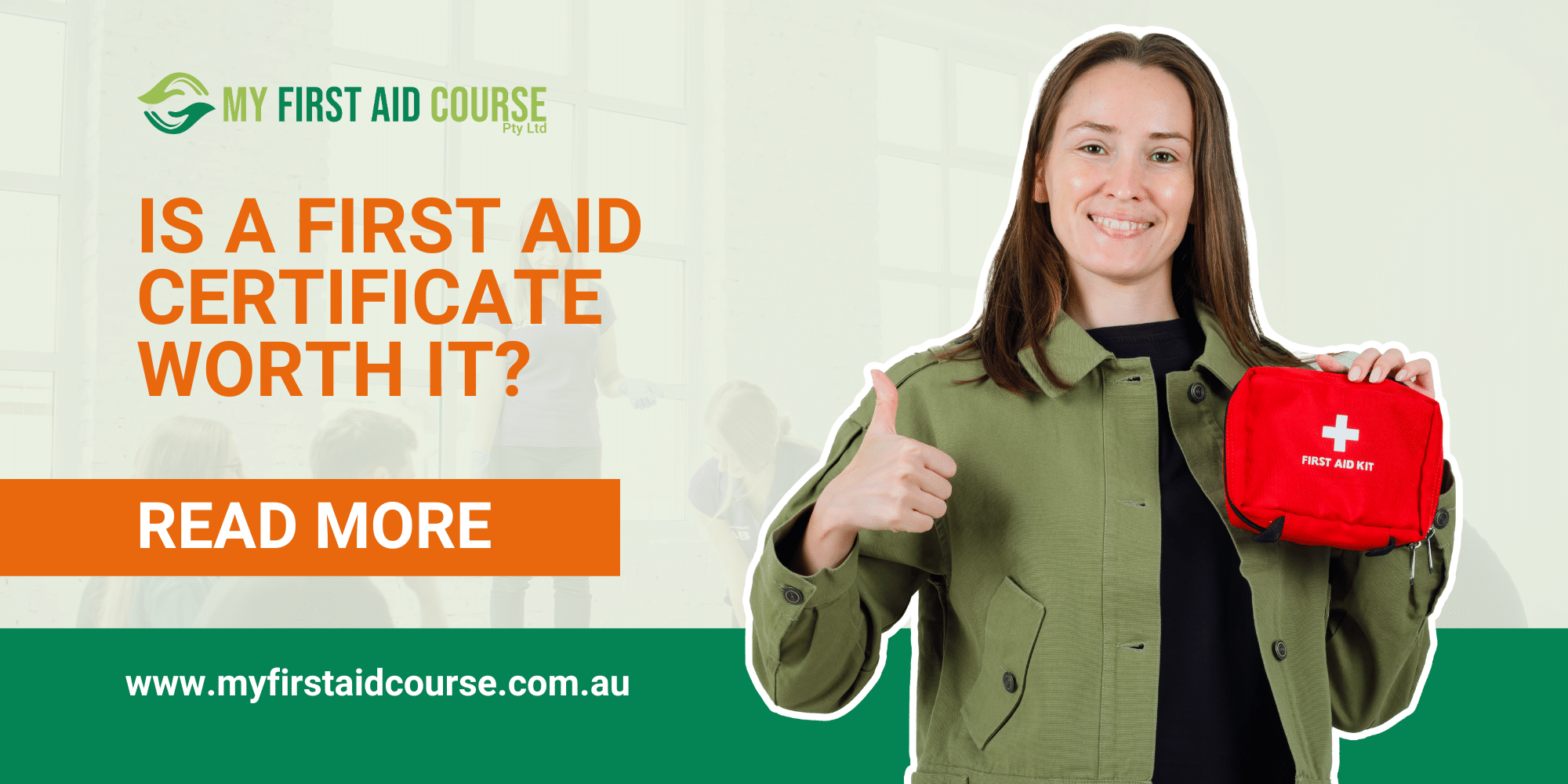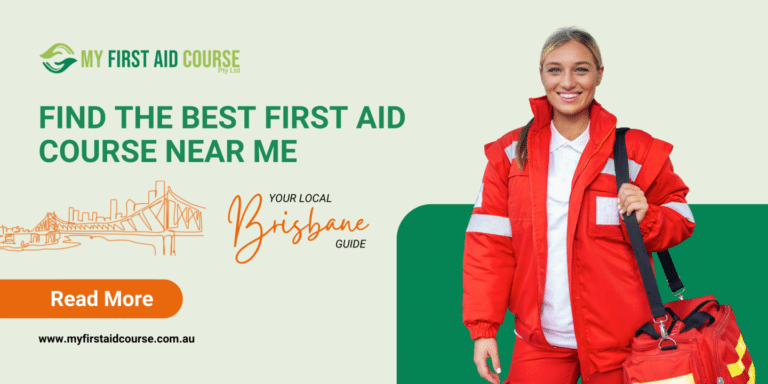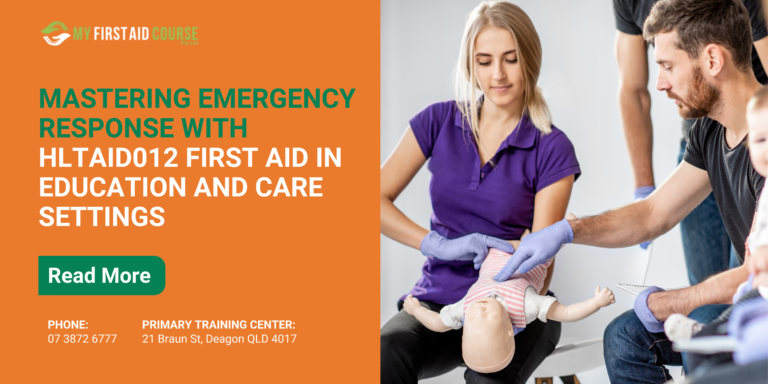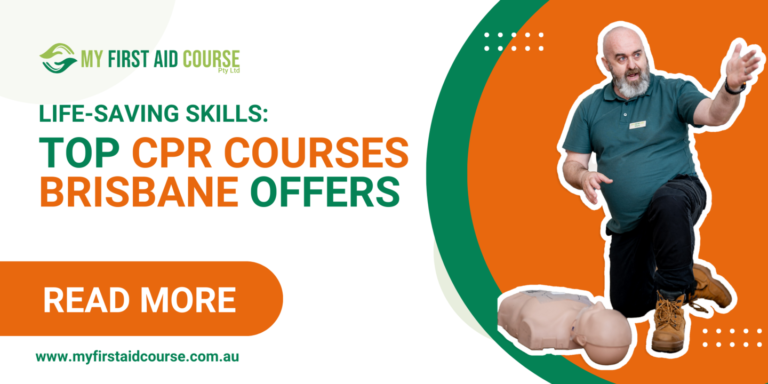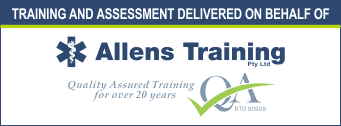Asking questions like, “Is a first aid certificate worth it?” Can you picture yourself as you act to help someone in need?
You might think it’s all about patching up cuts and doing CPR. There’s more to it than that! First aid training isn’t just about handling the rough stuff.
It’s also about gaining confidence and growing personally and professionally.
At My First Aid Course, we’ll answer your question, “Is a first aid certificate worth it?” and discuss obtaining a certificate, considering potential benefits such as job prospects and responding effectively in dangerous situations.
Stay with us until the end because we’ll dive into the legal aspects of first aid certification. So grab your gear – let’s head out on this journey together.
Ready to become a life-saver? Call us at 07 3872 6777 or secure your spot online today!
Table Of Contents:
- Understanding the Value of a First Aid Certificate
- How to Obtain A First Aid Certificate at My First Aid Course
- The Cost-Benefit Analysis of a First Aid Certificate
- Comparing Different Types of First Aid Certificates
- Real-World Applications of a First Aid Certificate
- The Lifespan and Renewal Process for a First Aid Certificate
- Legal Implications and Responsibilities with a First Aid Certificate
- The Impact of First Aid Certification on Community Safety
- FAQs about Is a First Aid Certificate Worth it?
- The Worth of a First Aid Certificate
Understanding the Value of a First Aid Certificate
A first aid certificate is more than just another tick on your resume.
Gaining a first aid certificate is an opportunity to acquire life-saving knowledge and skills, thus empowering yourself to act in an emergency situation for your benefit, your loved ones, or even strangers.
The value of this certification extends beyond personal growth and opens up professional opportunities.
For instance, specific jobs like childcare providers and outdoor instructors need such qualifications. But having these skills could also give you an edge in other fields.
Besides employment prospects, being certified gives you confidence to act decisively during emergencies without freezing or panicking.
A Red Cross survey showed that half of the respondents felt more confident after training.
The Personal Growth Aspect
First aid courses teach practical techniques for managing various health crises – from minor burns to heart attacks.
This knowledge helps individuals become self-reliant in emergencies when medical professionals are unavailable.
This learning process often sparks interest in medicine and healthcare among participants, and some even decide to pursue related careers post-training.
Gaining Professional Edge
In many professions such as education, sports coaching, or construction—a first aid certificate is mandatory due to its nature involving risk-prone activities.
Earning this qualification thus enhances employability by expanding potential career paths into these sectors while providing a competitive advantage within current roles where safety matters.
Community Impact
A first aid certificate is a powerful tool for community safety. The more people equipped with these skills, the safer our communities become.
This can be especially vital in remote or rural areas where medical help might take longer.
Confidence During Emergencies
Knowing first aid helps you to stay confident and cool-headed in a crisis. It lets you take immediate action, which can be life-saving.
Key Takeaway:
First aid certificates are not just resume fillers but tools for personal growth and professional opportunities. From being a childcare provider to an outdoor instructor, it gives you the edge in safety-focused roles. But it’s more than that; it boosts confidence in crises and even encourages community safety by equipping people with life-saving skills.
How to Obtain A First Aid Certificate at My First Aid Course
Getting a first aid certificate in Brisbane is straightforward at My First Aid Course. Here’s a step-by-step guide to help you navigate this rewarding journey:
Book Your Course & Learn Online
Start by booking your first aid course through our user-friendly online booking calendar.
After your booking is confirmed, you will be sent an email containing information about the location and time of your chosen assessment.
You can then conveniently complete the video-based online module on your preferred device at a time that suits you.
Complete Your Assessments
During the course, you’ll be expected to complete both written theory and practical assessments.
Before attending the practical session, you are required to complete the online pre-course learning and written theory.
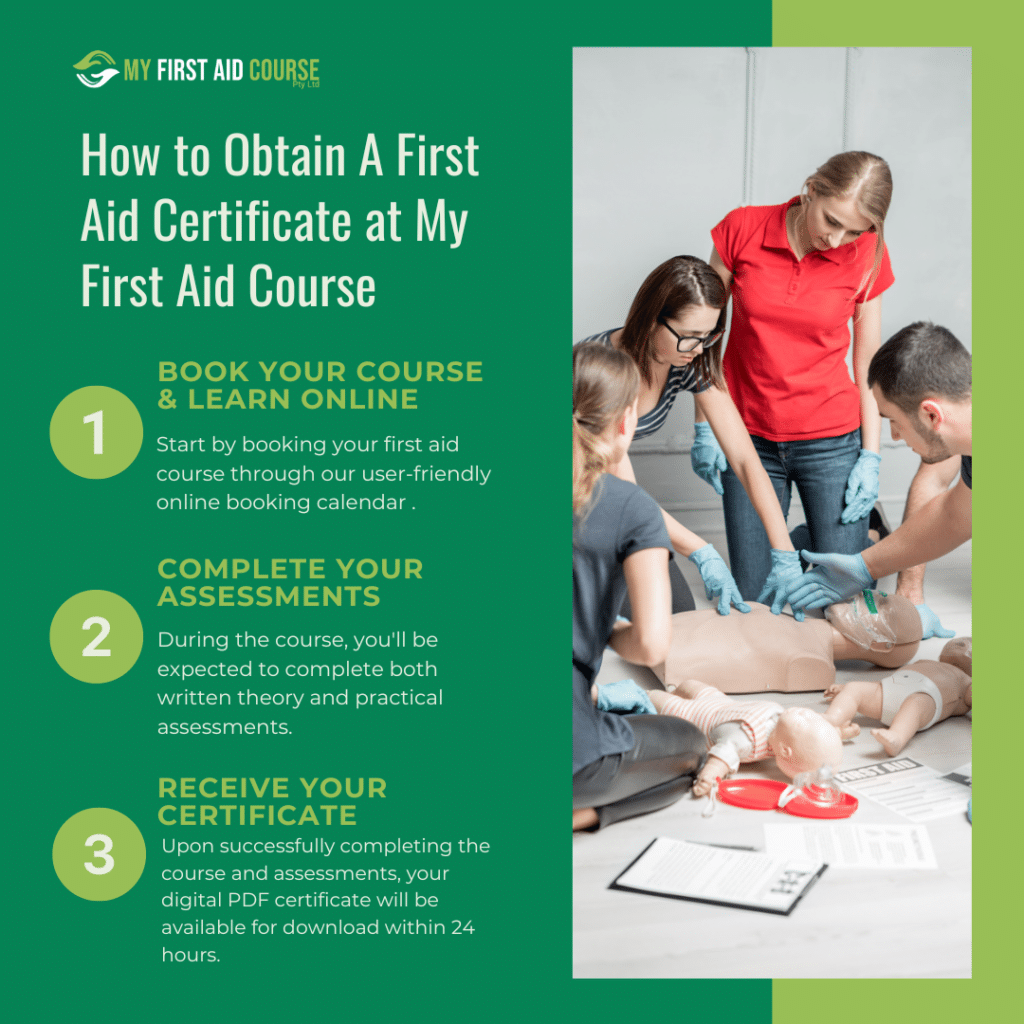
This ensures that you’re fully prepared and ready to engage when you arrive for the practical assessment.
Receive Your Certificate
Upon successfully completing the course and assessments, your digital PDF certificate will be available for download within 24 hours.
If you prefer a hard copy of your certificate, it can be requested in advance for an additional minimal fee. Please note that the delivery of hard copies via Australia Post may take up to 30 business days.
Becoming a certified first aid provider is not just about gaining a qualification; it’s about empowering yourself to make a difference in critical situations.
Start your journey today with My First Aid Course Brisbane, and be prepared to assist when it matters most!
Key Takeaway:
Pick the right course, sign up, complete all online modules, and ace your practical to secure your first aid certificate. Although getting your certification might take 1 to 2 days, remember that this isn’t just another qualification – you’re learning skills that could save lives.
The Cost-Benefit Analysis of a First Aid Certificate
When contemplating whether to get a first aid certification, weighing the expenditures against the possible advantages is essential. Let’s break down both sides.
The Costs Involved
There are some expenses tied to obtaining your first aid certificate.
First, you must pay for your first aid course at a nationally recognised training centre like My First Aid Course.
Prices vary, but expect to spend around $100-$150 AUD for comprehensive instruction covering CPR and emergency response scenarios.
There’s also time investment, and depending on the complexity of the course, it could take anywhere from half a day up to two full days of training – so factor in either lost wages or personal time as part of this equation, too.
You must also consider the added cost of travel, public transport, and parking. MFAC has ample free parking at all venues and are located conveniently through Brisbane city and surrounding areas.
Potential Benefits and Opportunities
A significant benefit is having life-saving skills and being able to help someone during medical emergencies, which is priceless.
More tangible advantages with certification include increased employability in certain fields such as child care, aged care, or even fitness coaching, where these skills can give you an edge over other candidates.
In addition, many companies view employees with first aid certificates favourably because they contribute towards maintaining a safer workplace environment.
Does It Pay Off?
When it comes to the value of a first aid certificate, you may ask if it’s worth the time and effort. Well, the answer to that question is yes!
This qualification not only gives you essential life-saving skills but also boosts your employability, making every minute spent on training pay off substantially.
Key Takeaway:
When considering getting a first aid certificate, don’t forget to consider the costs and benefits. Yes, there’s money and time involved – but it can also boost your employability in some fields, make workplaces safer, and even save lives. So when you weigh everything up, this training could lift your career and confidence seriously.
Comparing Different Types of First Aid Certificates
It is important to know that the various first aid certifications vary in course content, duration, cost, and recognition.
Standard First Aid Certificate
The most popular type of first aid certification in Australia is the HLTAID011 Provide First Aid, which is considered the industry standard.
It covers basic first aid training courses like CPR, bandaging wounds, and managing emergency situations until medical help arrives.
This certification suits everyone – from parents wanting to ensure their kids’ safety at home to workers needing these vital skills for workplace compliance.
The training typically lasts one day with an online component beforehand.
CPR Certification (Cardiopulmonary Resuscitation)
A CPR Certificate focuses solely on cardiopulmonary resuscitation techniques.
Although it’s part of the standard first aid certificate curriculum, it is required to be updated every 12 months to maintain currency. Also, some folks might only need this skill set because of specific job requirements or personal interests.
HLTAID009 Provide Cardiopulmonary Resuscitation typically require less time than full-fledged first aid courses.
But remember: having such focused knowledge could mean the difference between life and death during cardiac emergencies.
Child-Specific First Aid Courses
Child-specific courses (HLTAID012 Provide First Aid in an Education and Care Setting) are ideal if you work in childcare settings or have young children.
These focus on issues concerning youngsters, like choking hazards and fever management. These courses are necessary for mums and dads, grandparents, and babysitters.
The skills you learned can provide peace of mind, knowing you’re equipped to deal with any accidents or illnesses that may occur.
Advanced First Aid
You might need advanced courses if your job involves high-risk activities like construction sites or industrial settings, or you have access to advanced first aid equipment like oxygen therapy and suction devices.
These advanced courses are available at My First Aid Course in Brisbane.
- HLTAID015: Provide Advanced Resuscitation and Oxygen Therapy
- HLTAID014: Provide Advanced First Aid
- HLTAID013: Provide First Aid in Remote or Isolated Sites
These courses go into more detail about handling severe injuries and illnesses in the workplace with more equipment. These comprehensive courses are vital to effectively handle spinal injuries, utilise oxygen equipment, and establish a proficient first-aid response plan.
This level of preparedness is essential for ensuring the safety and well-being of all individuals in high-risk work environments.
Key Takeaway:
A CPR Certificate provides specialized training in cardiopulmonary resuscitation, which can be essential for certain job requirements or personal interests. Child-specific courses are a good choice for those spending time with children. These cover common problems related to kids.
Advanced first aid courses offered by My First Aid Course in Brisbane, such as HLTAID015, HLTAID014, and HLTAID013, are vital for individuals working in high-risk job settings like construction or industrial.
Real-World Applications of a First Aid Certificate
Knowing first aid is not just about having an edge in the job market or boosting your Curriculum Vitae. It’s about being equipped to help when it counts most in everyday situations and emergencies.
First aid skills, learnt from accredited courses like ours at My First Aid Course, can be applied in real-world scenarios ranging from daily incidents to full-blown emergency situations.
But how exactly do these skills translate into practical applications?
Safety at Home and Work
Australia sees its fair share of accidents at home and workplaces. Safe Work Australia reports thousands of work-related injuries annually, and some are fatal.
A first aid certificate arms you with knowledge on how to handle common accidents such as burns, cuts, or even choking incidents swiftly and correctly until professional medical help arrives.
Roadside Emergencies
In case you stumble upon a car accident scene before paramedics arrive, having undergone first aid training could mean the difference between life and death for someone involved.
You’ll know what steps need to be taken immediately: securing the area around casualties; checking their airway breathing & circulation (ABCs); providing necessary interventions; keeping them calm while waiting for professionals’ arrival – all crucial elements covered during our course here at My First Aid Course.
In The Great Outdoors
The Australian landscape offers excellent outdoor adventure opportunities, but risks come with that. Snake bites, heat strokes, or even getting lost in the wilderness are all potential dangers.
First aid training teaches you to handle such situations effectively – how to treat snake bites properly, respond if someone has a heat stroke, and survival skills like signaling for help if stranded.
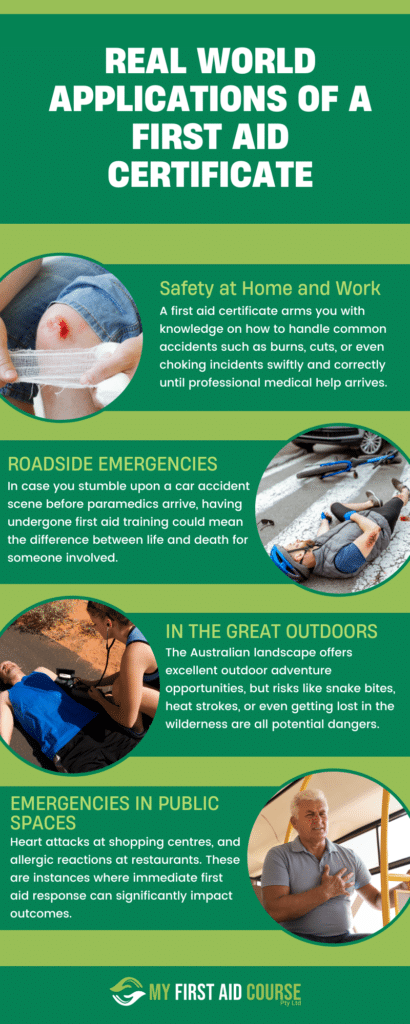
Emergencies in Public Spaces
In public spaces, emergencies can strike without warning. Heart attacks at shopping centres, and allergic reactions at restaurants. These are instances where immediate first aid response can significantly impact outcomes.
A first aid certificate ensures you’re not just a helpless bystander but an active participant who can save lives while waiting for medical professionals.
Key Takeaway:
Getting a first aid certificate isn’t just about sprucing up your CV – it’s about being ready to help in real-world situations.
It gives you the know-how to handle common accidents at home or work, assist in roadside emergencies before paramedics arrive, navigate dangers during outdoor adventures, and respond effectively when emergencies strike in public spaces.
The Lifespan and Renewal Process for a First Aid Certificate
Getting your first aid certificate is a big step, but it’s important to remember that this qualification isn’t forever and has an expiry date.
In Australia, most first aid certificates last three years before they need to be renewed.
This lifespan ensures you’re always up-to-date with the latest practices in medical response.
But don’t you worry, the renewal process isn’t as daunting as getting certified the first time around.
Maintaining Your Certification
You must take refresher courses periodically to keep your skills sharp and certification valid.
These short sessions are designed to update your knowledge of new techniques or equipment changes in emergency care.
Besides refreshing your existing knowledge, these courses give hands-on experience with new protocols introduced since your initial training.
The Recertification Process: Easier Than You Think.
When it comes time for recertification – usually every three years – there’s no need to panic.
The process is streamlined, so you can focus more on learning than administrative hurdles.
- Your provider will offer online options depending on what suits you best.
- At My First Aid Course, you may complete part of the course online and visit the centre to attend the assessment, saving both travel time and costs.
Necessary Skills Update – Annual CPR Refresher
It’s also recommended that you take an annual CPR refresher course.
The Australian Resuscitation Council advises this to ensure your life-saving skills are always at their peak.
This one-day course will keep your confidence high and readiness intact when dealing with emergency situations.
The Importance of Timely Renewal
Rushing for renewal at the last minute is a no-go. It’s crucial to renew your certification on time as most employers require valid first aid certificates from job applicants or existing employees handling safety roles.
Being late might mean missing out on opportunities.
Key Takeaway:
Don’t forget, your first aid certificate isn’t for life – it’s usually valid for three years here in Australia. Keep up your game and stay current with the newest methods by doing regular refresher courses. When renewal time rolls around, don’t stress. The process is made easy so you can concentrate more on learning. And remember to think about an annual CPR refresher course to keep those lifesaving skills sharp.
Legal Implications and Responsibilities with a First Aid Certificate
Becoming a certified first aider doesn’t just equip you with the skills to save lives.
It also comes with certain legal responsibilities that you should be aware of.
Your Duty as a Certified First Aider
When you get your first aid certificate, it’s like signing an invisible contract. You’re committing to provide help when someone is in need within the limits of your training.
This commitment isn’t about becoming a superhero but rather stepping up responsibly where others might not have the knowledge or confidence to do so.
Avoiding Negligence Claims
Did you know that if someone gets hurt by your actions, they could sue for negligence?
This is why understanding how far your responsibility extends is crucial. If there’s something outside of what was covered in our courses, best leave it to more qualified professionals.
So remember: always act within the scope of what you learned during your certification process.
CPR Liability Laws
We’ve got laws known as “Good Samaritan” rules, which shield those who provide CPR in urgent cases from being taken to court if something goes wrong – assuming they acted with good faith and without negligence.
These laws are designed to encourage people like you, equipped with life-saving skills through our certificates, to take action when necessary without fear of potential lawsuits later on.
If ever faced with such a situation, always remember your training: check for danger, assess the victim’s condition, and if it’s safe to do so, commence CPR.
Reporting Incidents
Sometimes, as a first aider, you might need to report incidents. This could be in workplaces or when dealing with minors.
Always follow the protocol of your specific setting and document everything accurately – this is another crucial part of avoiding legal pitfalls down the line.
You never know what can happen during an emergency situation – but that’s exactly why we train. So you’re ready for anything.
Key Takeaway:
Getting a first aid certificate is not just about gaining life-saving skills; it’s also about taking on legal responsibilities. You’re signing up to help when needed within your training limits.
But remember: act responsibly and avoid negligence claims by sticking to what you’ve learned in the course. “Good Samaritan” laws are there for protection, too—they shield CPR providers from lawsuits as long as they act honestly and with good intentions.
The Impact of First Aid Certification on Community Safety
First aid certification does more than just give individuals the ability to respond effectively in an emergency.
It also plays a crucial role in enhancing community safety and promoting public health efforts.
First aid training helps reduce recovery time and can make the difference between complete recovery and long-term disability or even death for a victim of sudden illness or injury.
This makes it essential not only for individual preparedness but also for creating safer communities.
A Safer Environment Through Awareness & Preparedness
Becoming certified doesn’t just let you provide help when needed; it fosters a mindset focused on prevention.
Understanding the dangers can enable folks to avoid potential risks, so they don’t have to endure any misfortune.
In workplaces, schools, sporting clubs – wherever there are groups of people – having trained first aiders around boosts overall safety awareness.
They act as vigilant guards who recognise potential hazards early enough to mitigate them before any harm occurs.
Faster Response Time During Emergencies
The sooner medical intervention begins after an incident, the more chances victims have of full recovery.
Every second counts during emergencies like cardiac arrests – one reason why we should strive towards increasing the number of skilled responders within our society.
In fact, MedicalSearch emphasises that for every minute delay in CPR, a victim’s survival chances decrease by 10%.
This highlights the value of having more community members trained to start lifesaving actions while waiting for professional medical help.
Boosting Confidence & Empowering Individuals
A first aid certificate can be an empowering tool. Knowing they can step up and act decisively during critical moments gives people confidence.
That sense of self-assurance benefits individuals and creates a resilient society ready to face emergencies head-on.
Plus, picking up these crucial skills doesn’t have to waste time or break the bank. You can find quick and affordable options out there.
FAQs about Is a First Aid Certificate Worth it?
Is learning first aid worth it?
Absolutely, First aid knowledge can help you save lives, handle emergencies confidently, and potentially land professional roles.
Why would it be useful to have a first-aid training certificate?
Having this certificate proves your competence in first aid. It opens doors for job opportunities, especially where safety is a priority, like childcare or construction.
What are the disadvantages of first aid?
The main drawback might be time and money spent on training. But remember – being able to respond effectively during an emergency is priceless.
Does getting a first aid certificate improve my job prospects?
Yes! Many employers value employees with this qualification as it demonstrates responsibility and preparedness for emergencies.
The Worth of a First Aid Certificate
Is a first aid certificate worth it? You bet!
You’ve learned that this certificate isn’t just about dressing wounds or performing CPR. It serves as a gateway to personal and professional development.
There might be some costs involved, yet these fade when weighed against the benefits, job opportunities, community safety contributions, and peace of mind knowing you’re ready to give medical assistance.
And lastly, don’t forget the legal responsibilities that accompany you once you’re certified!
My First Aid Course in Brisbane offers more than just courses and certification; it’s your chance to create an impact, to be the one who steps forward in a medical emergency, and to perform first aid procedures.
Come and join us as we work together to enhance the safety of our community in Brisbane. Ready to take the leap and get your first aid certificate? Book your course now at 07 3872 6777 or visit our website to learn more!

